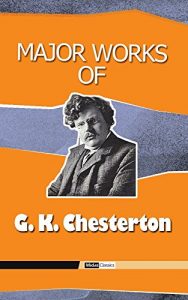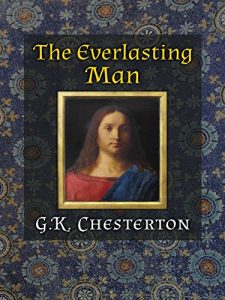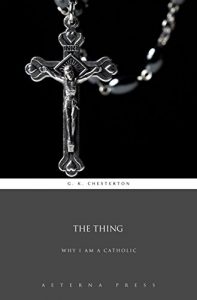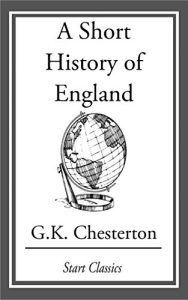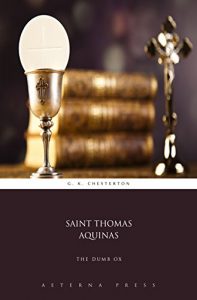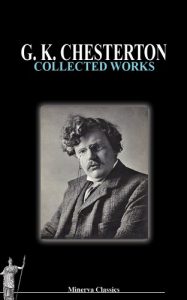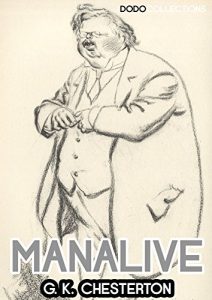On G. K. Chesterton:
Gilbert Keith Chesterton (29 May 1874 – 14 June 1936), better known as G. K. Chesterton, was an English writer, poet, philosopher, dramatist, journalist, orator, lay theologian, biographer, and literary and art critic. Chesterton is often referred to as the "prince of paradox." Time magazine has observed of his writing style: "Whenever possible Chesterton made his points with popular sayings, proverbs, allegories—first carefully turning them inside out."
Chesterton is well known for his fictional priest-detective Father Brown, and for his reasoned apologetics. Even some of those who disagree with him have recognized the wide appeal of such works as Orthodoxy and The Everlasting Man. Chesterton, as a political thinker, cast aspersions on both Progressivism and Conservatism, saying, "The whole modern world has divided itself into Conservatives and Progressives. The business of Progressives is to go on making mistakes. The business of the Conservatives is to prevent the mistakes from being corrected." Chesterton routinely referred to himself as an "orthodox" Christian, and came to identify this position more and more with Catholicism, eventually converting to Catholicism from High Church Anglicanism. George Bernard Shaw, Chesterton's "friendly enemy" according to Time, said of him, "He was a man of colossal genius." Biographers have identified him as a successor to such Victorian authors as Matthew Arnold, Thomas Carlyle, Cardinal John Henry Newman, and John Ruskin.
(Source: Wikipedia.org)
“Major Works of G. K. Chesterton” contains:
•An aesthetic cover page
•A beginning click-able Table of Contents for all titles
•Inner click-able Tables of Contents for all individual books with multiple chapters
•Nicely organized chapters and text
Author’s works in this collection include:
•THE NAPOLEON OF NOTTING HILL
•THE MAN WHO WAS THURSDAY: A NIGHTMARE
•THE BALL AND THE CROSS
•MANALIVE
•THE CLUB OF QUEER TRADES
•THE COMPLETE "FATHER BROWN"
•THE MAN WHO KNEW TOO MUCH
•THE WILD KNIGHT AND OTHER POEMS
•THE BALLAD OF THE WHITE HORSE
•ROBERT BROWNING
•GEORGE BERNARD SHAW
•APPRECIATIONS AND CRITICISMS OF THE WORKS OF CHARLES DICKENS
•HILAIRE BELLOC: THE MAN AND HIS WORK
•AESOP'S FABLES
•ALARMS AND DISCURSIONS
•ALL THINGS CONSIDERED
•THE APPETITE OF TYRANNY
•THE BARBARISM OF BERLIN
•THE CRIMES OF ENGLAND
•THE DEFENDANT
•EUGENICS AND OTHER EVILS
•HERETICS
•A HISTORY OF THE UNITED STATES
•LORD KITCHENER
•MAGIC: A FANTASTIC COMEDY
•A MISCELLANY OF MEN
•THE NEW JERUSALEM
•ORTHODOXY
•A SHORT HISTORY OF ENGLAND
•THE TREES OF PRIDE
•TREMENDOUS TRIFLES
•TWELVE TYPES
•UTOPIA OF USURERS AND OTHER ESSAYS
•VARIED TYPES
•THE VICTORIAN AGE IN LITERATURE
•WHAT I SAW IN AMERICA
•WHAT'S WRONG WITH THE WORLD
Gilbert Keith Chesterton (29 May 1874 – 14 June 1936), better known as G. K. Chesterton, was an English writer, poet, philosopher, dramatist, journalist, orator, lay theologian, biographer, and literary and art critic. Chesterton is often referred to as the "prince of paradox." Time magazine has observed of his writing style: "Whenever possible Chesterton made his points with popular sayings, proverbs, allegories—first carefully turning them inside out."
Chesterton is well known for his fictional priest-detective Father Brown, and for his reasoned apologetics. Even some of those who disagree with him have recognized the wide appeal of such works as Orthodoxy and The Everlasting Man. Chesterton, as a political thinker, cast aspersions on both Progressivism and Conservatism, saying, "The whole modern world has divided itself into Conservatives and Progressives. The business of Progressives is to go on making mistakes. The business of the Conservatives is to prevent the mistakes from being corrected." Chesterton routinely referred to himself as an "orthodox" Christian, and came to identify this position more and more with Catholicism, eventually converting to Catholicism from High Church Anglicanism. George Bernard Shaw, Chesterton's "friendly enemy" according to Time, said of him, "He was a man of colossal genius." Biographers have identified him as a successor to such Victorian authors as Matthew Arnold, Thomas Carlyle, Cardinal John Henry Newman, and John Ruskin.
(Source: Wikipedia.org)
“Major Works of G. K. Chesterton” contains:
•An aesthetic cover page
•A beginning click-able Table of Contents for all titles
•Inner click-able Tables of Contents for all individual books with multiple chapters
•Nicely organized chapters and text
Author’s works in this collection include:
•THE NAPOLEON OF NOTTING HILL
•THE MAN WHO WAS THURSDAY: A NIGHTMARE
•THE BALL AND THE CROSS
•MANALIVE
•THE CLUB OF QUEER TRADES
•THE COMPLETE "FATHER BROWN"
•THE MAN WHO KNEW TOO MUCH
•THE WILD KNIGHT AND OTHER POEMS
•THE BALLAD OF THE WHITE HORSE
•ROBERT BROWNING
•GEORGE BERNARD SHAW
•APPRECIATIONS AND CRITICISMS OF THE WORKS OF CHARLES DICKENS
•HILAIRE BELLOC: THE MAN AND HIS WORK
•AESOP'S FABLES
•ALARMS AND DISCURSIONS
•ALL THINGS CONSIDERED
•THE APPETITE OF TYRANNY
•THE BARBARISM OF BERLIN
•THE CRIMES OF ENGLAND
•THE DEFENDANT
•EUGENICS AND OTHER EVILS
•HERETICS
•A HISTORY OF THE UNITED STATES
•LORD KITCHENER
•MAGIC: A FANTASTIC COMEDY
•A MISCELLANY OF MEN
•THE NEW JERUSALEM
•ORTHODOXY
•A SHORT HISTORY OF ENGLAND
•THE TREES OF PRIDE
•TREMENDOUS TRIFLES
•TWELVE TYPES
•UTOPIA OF USURERS AND OTHER ESSAYS
•VARIED TYPES
•THE VICTORIAN AGE IN LITERATURE
•WHAT I SAW IN AMERICA
•WHAT'S WRONG WITH THE WORLD
